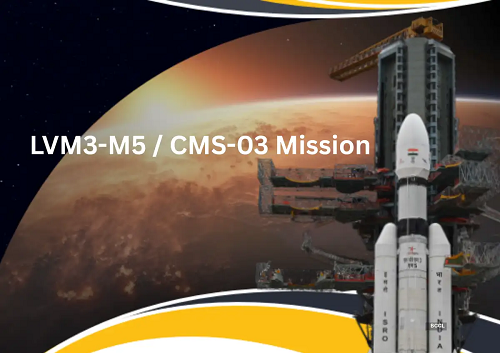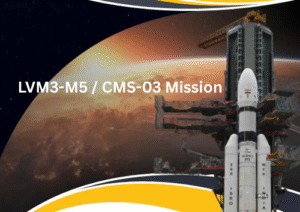In a landmark achievement for India’s space program, the Indian Space Research Organisation (ISRO) successfully launched its heaviest-ever communication satellite, CMS-03 (GSAT-7R), from the Satish Dhawan Space Centre on Sunday evening.
The 4,410 kg satellite, carried aboard the powerful Launch Vehicle Mark-III (LVM-3)—nicknamed ‘Bahubali’—marks a historic milestone as the heaviest satellite ever launched from Indian soil. The mission, designated LVM3-M5, underscores India’s advancing capabilities in launching heavy payloads indigenously, eliminating reliance on foreign launch platforms.
The CMS-03 is a state-of-the-art military communication satellite designed specifically for the Indian Navy, serving as a replacement for the aging GSAT-7 “Rukmini”, launched in 2013.
Equipped with multi-band communication technology, CMS-03 will enable secure, real-time voice, video, and data links across India’s vast maritime domain. The satellite will bolster network-centric warfare capabilities, seamlessly connecting warships, submarines, aircraft, and shore-based command centres across the Indian Ocean Region (IOR).
“CMS-03 will significantly enhance India’s maritime situational awareness and operational readiness,” said a senior ISRO official. “This mission reinforces our commitment to self-reliance in critical defence technologies.”
Although ISRO has previously developed heavier satellites—like the 5,854 kg GSAT-11—those were launched using foreign rockets from international spaceports. The CMS-03 launch, however, represents a 100% indigenous effort, highlighting the maturity of India’s LVM-3 launch vehicle.
The LVM-3, which also powered the Chandrayaan-3 lunar mission, has now cemented its reputation as India’s most dependable heavy-lift rocket. Capable of placing 4–5 tonne-class satellites into Geosynchronous Transfer Orbit (GTO), it paves the way for future high-capacity communication missions and interplanetary exploration.
The successful deployment of CMS-03 aligns with India’s long-term goal of building a secure and self-reliant space-based defence communication network. It will enhance the Navy’s coordination, surveillance, and tactical operations across the Indian Ocean, where India plays an increasingly vital strategic role.
As the satellite settles into its Geosynchronous Transfer Orbit, ground teams will initiate orbit-raising manoeuvres over the next few days to position it in its final Geostationary Orbit.
With CMS-03, ISRO not only reinforces India’s space prowess but also strengthens the nation’s maritime security infrastructure—a dual triumph for technology and defence.







